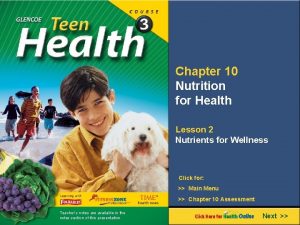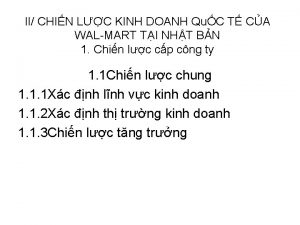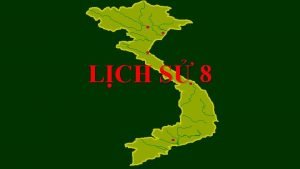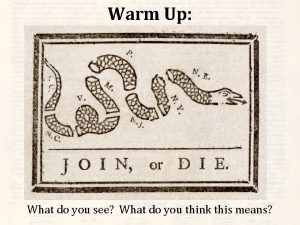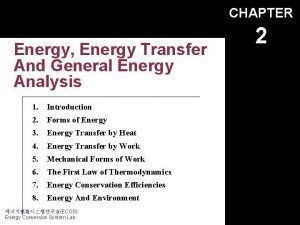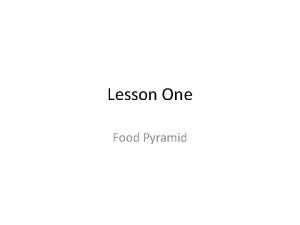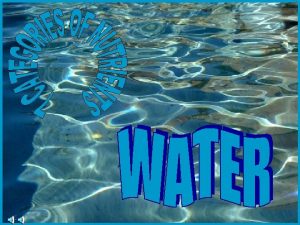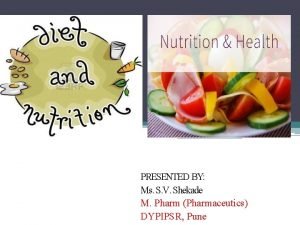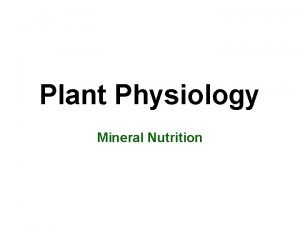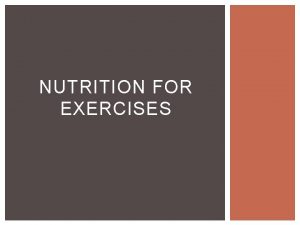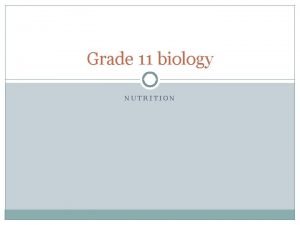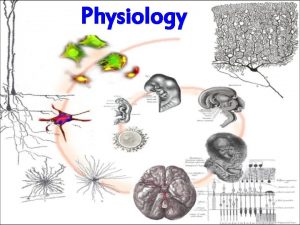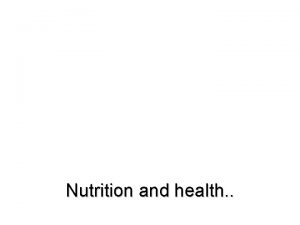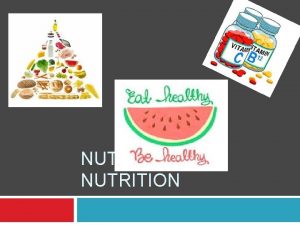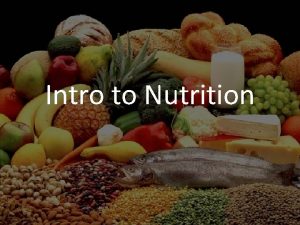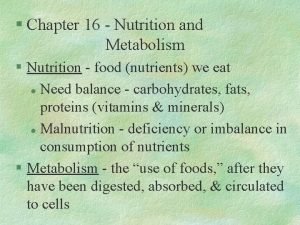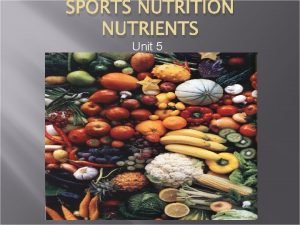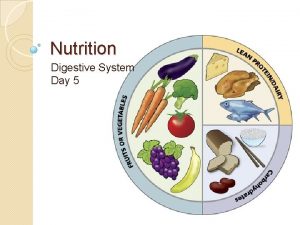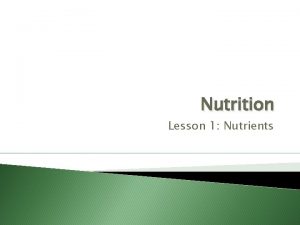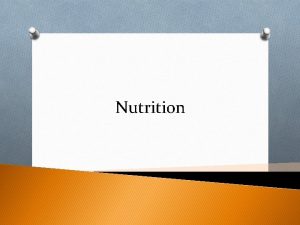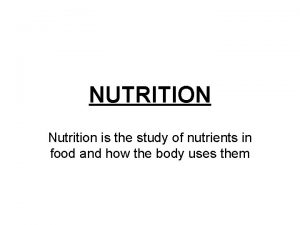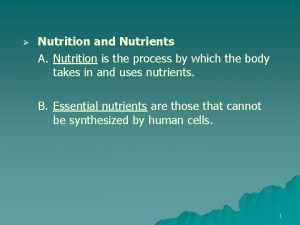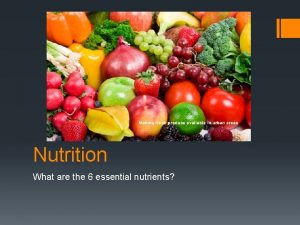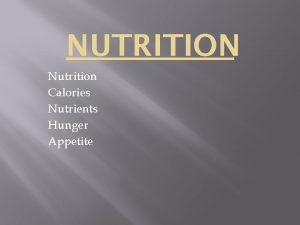Nutrition 6 NUTRIENTS 3 Nutrients that give energy



















- Slides: 19

Nutrition 6 NUTRIENTS

3 Nutrients that give energy? ? ? �Carbohydrate 4 Calories/gram �Protein 4 Calories/gram �Fat 9 Calories/gram

Carbohydrate � Preferred source of energy for the body � Provides energy for involuntary activity Heart beat, brain activity � Simple carbs (sugar) Provide energy but generally don’t provide other nutrients � Complex carbs Starches � Pasta, rice, bread, whole grains Fiber � NOT digestible, � Helps regulate digestion � Reduces chances of colon cancer

Fats �Despite what you may have heard, fat IS A NECESSARY PART OF THE DIET!!! � 1 lb of fat = 3500 Calories If you burned 500 more calories than you consume in one day, how long would it take you to lose 1 pound? � 7 days �Certain Vitamins are fat soluble A, D, E, K � 3 types of fat Saturated fat Unsaturated fat Trans fat �Limit your fat grams to 65 -80 grams per day (depending on calorie intake) Of those, only 20 grams should be saturated

Saturated Fat � Found in animal sources � Saturated fats are generally solid at room temp. � Can be part of your diet, but is considered to be “less healthy” than unsaturated fat Diets high in saturated fat put that person at a higher risk for heart disease � Meats, cheeses, milk, poultry Red meat, such as beef, has more fat than poultry (chicken or turkey)

Unsaturated Fat �Much healthier than saturated fat �Liquid at room temp. �Includes vegetable oils, olive oil, nuts, and olives

Trans Fat �“Hydrogenated” �Even if a product is “trans fat free”, if “partially hydrogenated oil” is in the ingredients list, IT HAS TRANS FAT IN THE PRODUCT. �You should have ZERO trans fat in your diet. �Trans fat increases LDL cholesterol (bad) and decreases HDL cholesterol (good) �So why would they use trans fat in food? Add flavor Increases shelf life. The food lasts longer.

Protein �Building blocks for muscle and other body organs �Grows, develops and repairs body tissues �Can be used as energy, but only in emergencies. Only about 15% of calories burned come from protein �Builds enzymes and hormones �Builds antibodies

�Amino acids- building blocks of protein �Essential amino acids- must come from the food you eat �Complete Protein-has all 8 essential amino acids, animal products- meat, cheese, milk eggs �Incomplete Protein- does not have all 8 essential amino acids. Examples are plant based- nuts, beans, seeds, legumes

Water �Essential for all body functions � 8 cups per day for nonactive people �Need more if you’re active �Compiles about 60% of body weight

Vitamins �Two types Fat Soluble (In general, you get vitamins A, D, E, & K from dark colored veggies. Spinach, carrots, sweet potatoes, etc. ) �A �D �E �K Water Soluble (In general, you get vitamins B & C from brightly colored fruit. Apples, oranges, lemons, etc. ) �B �C

Vitamin A �Vitamin A Important for: � Eyesight � Skin � Immunity � Growth You get vitamin A from: � Milk � Carrots � Spinach

Vitamin D �Vitamin D Important for: � Bone integrity � Strong teeth You get it from: � Milk � Sunlight (Your body actually makes vitamin D from the sun)

Vitamin E �Vitamin E Important for: � Antioxidant Resists damage from “free radicals”, especially in the lungs You get it from: � Some oils � Sunflower seeds � Other nuts

Vitamin K �Vitamin K Important for: � Blood clotting You get it from: � Cabbage � Spinach

Vitamin C �Vitamin C Important for: � Antioxidant � Maintains connective tissue Collagen Ligaments You get it from: � Oranges/orange juice (one glass of orange juice gets you most of the vitamin c you need for the day) � Limes � Lemons � Strawberries

Vitamin B (B-Complex ) �Considered “co-enzymes” Combines with other enzymes to do the bodies building The fat, carbs, and protein and the fuel �B vitamins help the body use that fuel. You get it from: � Breads � Poultry � Eggs

Minerals �Calcium Creates strong bones and teeth Helps with blood clotting Milk (3 cups per day gets you all the calcium you need) Cheese Broccoli �Sodium 1500 mg per day needed, but 2300 mg MAX. Fluid and electrolyte balance Maintains fluid levels Muscle contraction and nerve function In almost all foods

Minerals (cont. ) �Potassium Fluid and electrolyte balance Muscle contraction Orange juice Bananas Baked potatoes Salmon �Any questions? ? ?
 Chapter 10 nutrition for health lesson 2 nutrients
Chapter 10 nutrition for health lesson 2 nutrients Phân độ lown
Phân độ lown Block av độ 1
Block av độ 1 Thơ thất ngôn tứ tuyệt đường luật
Thơ thất ngôn tứ tuyệt đường luật Thơ thất ngôn tứ tuyệt đường luật
Thơ thất ngôn tứ tuyệt đường luật Walmart thất bại ở nhật
Walmart thất bại ở nhật Tìm vết của đường thẳng
Tìm vết của đường thẳng Con hãy đưa tay khi thấy người vấp ngã
Con hãy đưa tay khi thấy người vấp ngã Tôn thất thuyết là ai
Tôn thất thuyết là ai Gây tê cơ vuông thắt lưng
Gây tê cơ vuông thắt lưng Sau thất bại ở hồ điển triệt
Sau thất bại ở hồ điển triệt What is the main idea of give me liberty or give me death
What is the main idea of give me liberty or give me death Energy energy transfer and general energy analysis
Energy energy transfer and general energy analysis Energy energy transfer and general energy analysis
Energy energy transfer and general energy analysis Energy input and output nutrition
Energy input and output nutrition Food pyramid questions
Food pyramid questions Major categories of nutrients
Major categories of nutrients 10 nutrients found in quick breads
10 nutrients found in quick breads Conclusion of nutrients
Conclusion of nutrients Essential plant nutrients definition
Essential plant nutrients definition
